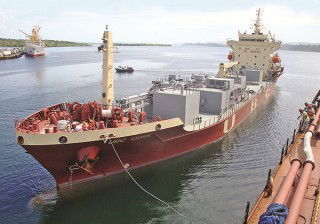Will 2006 be the year for coal? Since 2003 the dry bulk market has been mainly driven by the Chinese iron ore boom which is not finished but will certainly know a more moderate growth. Higher oil prices have renewed the interest in coal as a source of power generation in many countries that cannot rely on nuclear electricity. Exporting countries such as Indonesia, South Africa and Australia have made huge investments to upgrade their coal export output with the negative effect of loading the market with additional tons which may bear on prices, but may also accelerate investments in coal-based power plants. Such scenarios will offer some good opportunities to shipping as according to various sources the three main coal exporters would put a minimum of 15Mt more this year on the export market.
Back to today: a slow but positive start as Panamax market was first expected to keep firming on the grounds of fresh enquiries in both basins. As tonnage built up, charterers became more bearish and switched to a standby/observation mode expecting the market to soften. Today’s indices may prove them right as both Atlantic and Pacific decreased. To be noted, a 1991 73,000 dwt fixed for 3-5 month at US$18,000 per day and a 2005 built 75,000 tonner fixed at around US$19,000 for 4-6 months. No long term period fixture reported.
Unlike the Panamax and Cape indexes, the Supramax market did not show any real signs of optimism at the beginning of the first week of 2006. The global index went down 3 points and only the Pacific area seemed to be healthy enough with few short period deals reported. Tess 45 are paid around US$17,000 for 3/5 months when Supramax are valued between US$18,000 and US$19,000 for the same period. One has to notice, however, the fixture of a newbuilding 55,000dwt ex-yard at US$16,400 for 1 year by Korean charterers. The Atlantic doesn’t look so bright with quite a few spot positions reported in the Continent/Med area, even if the South Atlantic remained quite well sustained due to various ships being delayed in West Africa.
Source: Barry Rogliano Salles, Shipbrokers, Paris


